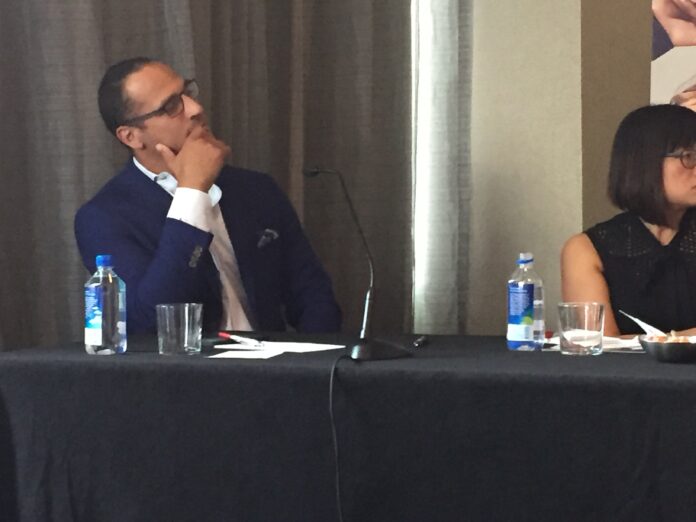By Louis Chan
AsAmNews National Correspondent
Six months after a Boston sports talk host used a faux-Chinese accent to mock super sports agent Don Yee, he apologized once again before a crowd of more than 100 Asian American journalists.
Christian Fauria of WEEI in Boston called himself “beyond embarrassed” and said “even though I knew better, I did it anyway. I apologize.
”I knew it. I was out of line. I knew right away.”
The incident happened on a Friday during the Winter Olympics. Fauria recalls his Twitter blowing up. Many derided him. Some defended him. His bosses were out of town, but he got a call that evening from station management about his actions. He immediately reached out to Yee to apologize.
As part of that apology, Fauria said he agreed with Yee’s request to take part in a public forum to discuss the incident.
The panel discussion took place during the Asian American Journalists Association convention being held this week in Houston.
Also on the panel we’re Shirley Leung, a columnist with the Boston Globe, and Jonathan Choe, a reporter with NBC10 in Boston. Moderating the panel was Michelle Steele of ESPN.
“We’re open to a dialogue,” said Fauria, speaking about his station WEEI. “To me this is a start. I will only take ownership for what I did. I’m bound to say something stupid. I say stupid stuff all the time. What I want to make sure I don’t cross the line again.
”Let’s be respectful of people and be entertaining. You’re trying to be yourself and be honest and sometimes you screw up.”
WEEI shut the station down for a day so that it’s entire staff could attend sensitivity training. Faustia says another sensitivity session is planned.
After being pressed by Choe, the radio host pledged to mentor an Asian American student about sports radio.
“Thank you so much for apologizing and apologizing again,” said Choe who said he accepted the apology as sincere.
Leung, who wrote about the incident in her column, said she received some backlash from people who defended Fauria.
“This is one of the worst things you can do to an Asian American, to mock them. It’s a reminder they will always be considered a foreigner.”
Fauria says he played the audio of his kids who are part Japanese and Korean. One of his daughters ran from the room crying.
He tried to make the experience a teaching moment for his children.
“Be aware of who you are. Empathy is s big part of discussion,” he said. “You can’t walk in someone’s shoes. It’s important when you hear someone else,listen. My main goal is to come and listen.”

